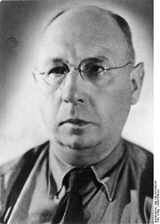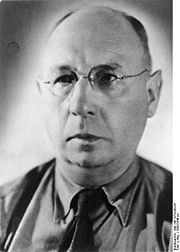
Hermann Brill
Encyclopedia

Germany
Germany , officially the Federal Republic of Germany , is a federal parliamentary republic in Europe. The country consists of 16 states while the capital and largest city is Berlin. Germany covers an area of 357,021 km2 and has a largely temperate seasonal climate...
doctor of law and a politician (SPD
Social Democratic Party of Germany
The Social Democratic Party of Germany is a social-democratic political party in Germany...
).
Biography
Brill was born in the small town of GräfenrodaGräfenroda
Gräfenroda is a municipality in Thuringia in the northeast of the Thüringer Wald forest, Ilm-Kreis district. Gräfenroda is the seat of the Verwaltungsgemeinschaft Oberes Geratal....
, Thuringia
Thuringia
The Free State of Thuringia is a state of Germany, located in the central part of the country.It has an area of and 2.29 million inhabitants, making it the sixth smallest by area and the fifth smallest by population of Germany's sixteen states....
on February 9, 1895 as the son of a tailor; after finishing school, he attended the Herzog-Ernst-Seminar in Gotha
Gotha (town)
Gotha is a town in Thuringia, within the central core of Germany. It is the capital of the district of Gotha.- History :The town has existed at least since the 8th century, when it was mentioned in a document signed by Charlemagne as Villa Gotaha . Its importance derives from having been chosen in...
to become a teacher. His political career began in 1918, when he entered the USPD
Independent Social Democratic Party of Germany
The Independent Social Democratic Party of Germany was a short-lived political party in Germany during the Second Reich and the Weimar Republic. The organization was established in 1917 as the result of a split of left wing members of the Social Democratic Party of Germany...
; less than two years later, he became a member of the Thuringia
Thuringia
The Free State of Thuringia is a state of Germany, located in the central part of the country.It has an area of and 2.29 million inhabitants, making it the sixth smallest by area and the fifth smallest by population of Germany's sixteen states....
n parliament (Landtag
Landtag
A Landtag is a representative assembly or parliament in German-speaking countries with some legislative authority.- Name :...
) for the first time, where he stayed until 1933.
However, Brill only stayed a member of the USPD for four years; in 1922, he left the party again and found his new political home in the Socialist Party of Germany (SPD) instead. In 1932, Brill was also a member of the federal German parliament (Reichstag
Reichstag (Weimar Republic)
The Reichstag was the parliament of Weimar Republic .German constitution commentators consider only the Reichstag and now the Bundestag the German parliament. Another organ deals with legislation too: in 1867-1918 the Bundesrat, in 1919–1933 the Reichsrat and from 1949 on the Bundesrat...
).
The Nazis
Nazism
Nazism, the common short form name of National Socialism was the ideology and practice of the Nazi Party and of Nazi Germany...
were met with resistance from Brill ever since he first came in contact with them after they became part of the reigning coalition in Thuringia in 1930; Brill was especially opposed to the politics of Nazi minister of the interior Wilhelm Frick
Wilhelm Frick
Wilhelm Frick was a prominent German Nazi official serving as Minister of the Interior of the Third Reich. After the end of World War II, he was tried for war crimes at the Nuremberg Trials and executed...
, and led a committee of investigation established by the Landtag in 1932 that scrutinised Frick's practices. It was also during this time that he met Adolf Hitler
Adolf Hitler
Adolf Hitler was an Austrian-born German politician and the leader of the National Socialist German Workers Party , commonly referred to as the Nazi Party). He was Chancellor of Germany from 1933 to 1945, and head of state from 1934 to 1945...
, who appeared as a witness in front of the committee, an experience that led to Brill making the decision to resist Hitler "at any time, anywhere and under every circumstance" ("jederzeit, überall, unter allen Umständen").
Following Hitler's rise to power, Brill left the SPD in May 1933, scandalised by the party executive's passive attitude towards Hitler; one year later, he founded the Deutsche Volksfront, a resistance group, in Berlin
Berlin
Berlin is the capital city of Germany and is one of the 16 states of Germany. With a population of 3.45 million people, Berlin is Germany's largest city. It is the second most populous city proper and the seventh most populous urban area in the European Union...
together with Otto Brass. Brill also wrote a number of essays and leaflets during this time; he was arrested several times by the Gestapo
Gestapo
The Gestapo was the official secret police of Nazi Germany. Beginning on 20 April 1934, it was under the administration of the SS leader Heinrich Himmler in his position as Chief of German Police...
, and after the workings of the Deutsche Volksfront were discovered, was convicted of high treason
High treason
High treason is criminal disloyalty to one's government. Participating in a war against one's native country, attempting to overthrow its government, spying on its military, its diplomats, or its secret services for a hostile and foreign power, or attempting to kill its head of state are perhaps...
in 1938 and sentenced to 12 years in prison.
After first being jailed in the Zuchthaus Brandenburg-Görden
Brandenburg-Görden Prison
Brandenburg-Görden Prison is located on Anton-Saefkow-Allee in the Görden section of Brandenburg an der Havel. Erected between 1927 and 1935, it was built to be the most secure and modern prison in Europe. It was a Zuchthaus for inmates with lengthy or life sentences at hard labor, as well as...
, he was brought to the Buchenwald concentration camp
Buchenwald concentration camp
Buchenwald concentration camp was a German Nazi concentration camp established on the Ettersberg near Weimar, Germany, in July 1937, one of the first and the largest of the concentration camps on German soil.Camp prisoners from all over Europe and Russia—Jews, non-Jewish Poles and Slovenes,...
in 1943; following the liberation of Buchenwald on April 11, 1945, he wrote the Buchenwald Manifesto (Buchenwalder Manifest der demokratischen Sozialisten).
The same month, Brill also began creating a plan for the administrative rebuilding of Thuringia for the American
United States
The United States of America is a federal constitutional republic comprising fifty states and a federal district...
administration. In June 1945, he was appointed Regierungspräsident (president of the government) of Thuringia
Thuringia
The Free State of Thuringia is a state of Germany, located in the central part of the country.It has an area of and 2.29 million inhabitants, making it the sixth smallest by area and the fifth smallest by population of Germany's sixteen states....
, an office he lost again in July after Thuringia became part of the Soviet occupation zone, due to pressure from Walter Ulbricht
Walter Ulbricht
Walter Ulbricht was a German communist politician. As First Secretary of the Socialist Unity Party from 1950 to 1971 , he played a leading role in the creation of the Weimar-era Communist Party of Germany and later in the early development and...
. In May 1945, he founded the Bund Demokratischer Sozialisten (Federation of Democratic Socialists) in Thuringia, which finally evolved into Thuringia's SPD
Social Democratic Party of Germany
The Social Democratic Party of Germany is a social-democratic political party in Germany...
branch, with Brill as its first chairman, but after being arrested and interrogated twice by the Soviet administration, he left Thuringia at the end of 1945 and began working for the American administration in Berlin
Berlin
Berlin is the capital city of Germany and is one of the 16 states of Germany. With a population of 3.45 million people, Berlin is Germany's largest city. It is the second most populous city proper and the seventh most populous urban area in the European Union...
.
In 1948, Brill helped draft a constitution (Grundgesetz) for the new German republic, and from 1949 to 1953, he was a member of the first Bundestag
Bundestag
The Bundestag is a federal legislative body in Germany. In practice Germany is governed by a bicameral legislature, of which the Bundestag serves as the lower house and the Bundesrat the upper house. The Bundestag is established by the German Basic Law of 1949, as the successor to the earlier...
, the parliament of the newly-founded Germany; in his last year as a member of parliament, he put through the first Bundesentschädigungsgesetz (compensation law) for those who had been subjected to prosecution based on political views, race or religion.
In later years, Brill taught at the universities of Frankfurt
Frankfurt
Frankfurt am Main , commonly known simply as Frankfurt, is the largest city in the German state of Hesse and the fifth-largest city in Germany, with a 2010 population of 688,249. The urban area had an estimated population of 2,300,000 in 2010...
and Speyer
Speyer
Speyer is a city of Rhineland-Palatinate, Germany with approximately 50,000 inhabitants. Located beside the river Rhine, Speyer is 25 km south of Ludwigshafen and Mannheim. Founded by the Romans, it is one of Germany's oldest cities...
. He was responsible for the introduction of political science
Political science
Political Science is a social science discipline concerned with the study of the state, government and politics. Aristotle defined it as the study of the state. It deals extensively with the theory and practice of politics, and the analysis of political systems and political behavior...
as a field of study in Germany and wrote several articles pertaining to issues such as German reunification
German reunification
German reunification was the process in 1990 in which the German Democratic Republic joined the Federal Republic of Germany , and when Berlin reunited into a single city, as provided by its then Grundgesetz constitution Article 23. The start of this process is commonly referred by Germans as die...
.
Hermann Brill died on June 22, 1959 in Wiesbaden
Wiesbaden
Wiesbaden is a city in southwest Germany and the capital of the federal state of Hesse. It has about 275,400 inhabitants, plus approximately 10,000 United States citizens...
.

